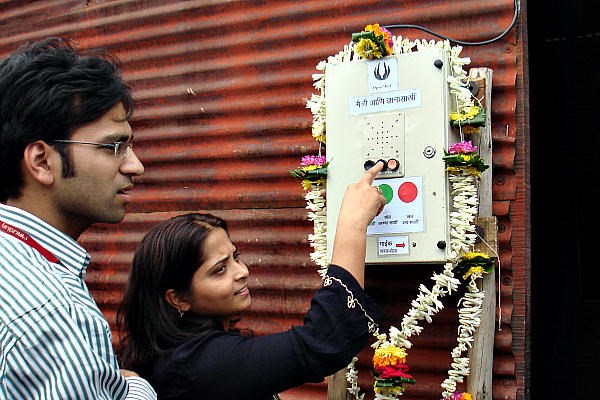 |
| People without internet access in parts of India and Africa can go to a public Question Box, press a button, and receive answers to their questions. Open Mind – Question Box |
For millions in the developing world who can't just "Google it," a box is providing the answers.
To begin, users push a green "talk" button on the metal intercom box and ask a question in their local language. An operator in a larger town with more Internet bandwidth will look up their questions online and relay the answers to the caller. The red button ends the call.
The Question Box was created by Open Mind, a nonprofit founded by Rose Shuman in partnership with the Grameen Foundation.
Internet access is not given a second thought in the developed world, but for billions around the globe, the Internet is far out of reach.
"Question Boxes leap over illiteracy, computer illiteracy, lack of networks, and language barriers," according to Shauman and fellow organizers. "They provide immediate, relevant information to people using their preferred mode of communication: speaking and listening."
Remote villages in India were the first to benefit from the Question Box in 2007. In April 2009, it was introduced in Uganda, but with modifications to fit African resources.
For example, Uganda's Internet connection is too slow. So Question Box scrapped the physical boxes and built a network of field agents with mobile phones, common throughout Uganda. The field agents either relay users' questions to a call center or let people ask the questions themselves.
Operators search local databases created by Ugandan company Appfrica Labs, which serves as host of the call center. In the database are diverse sources of information: government statistics, answers to past questions, research papers, and a repository of documents, all pertaining to the local area.
The Question Box is a powerful economic tool. With over 80 percent of Uganda's workforce employed in the agricultural sector, the ability to receive information regarding crops is essential.
"We are helping farmers make decisions regarding where to sell, what to plant, and how to best take care of their crops," said Schuman. "It's all about giving communities the ability to help themselves."
Technology comes in many different formats. Now, information comes in a box.
Page created on 4/26/2012 12:00:00 AM
Last edited 4/26/2012 12:00:00 AM
